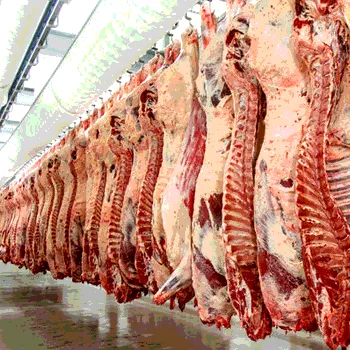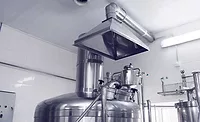A Different Type of Herd Immunity: The SAFE TO WORK Act in the Meat Processing Industry

Working from the comfort of home is not the reality for those essential workers who safeguard the U.S. food supply. In late April, while meat processing and packing facilities started to shut down after suffering significant coronavirus disease (COVID-19) outbreaks, the federal government ordered their doors to stay open to maintain the food supply chain. Many state assemblies quickly stepped in to provide protections for those facility owners and operators from worker-based claims. As many additional businesses and civic institutions have reopened, federal and state legislators alike have attempted to answer the question on many minds: Who bears responsibility if an individual becomes infected with COVID-19 through exposure at businesses and schools? Employers, employees, families, and customers alike are concerned not only about their collective health but also how the answer to that question impacts their livelihoods.
After months of state governments enacting COVID-19-related laws attempting to balance public health concerns with commercial realities, Congress proposed legislation on July 27, 2020, to address civil claims involving businesses that open their doors (or those whose doors never closed) during the pandemic. Legal protections from COVID-related litigation may be on the horizon in the form of the recently proffered SAFE TO WORK Act. The Act, which is designed to “lessen the burdens on interstate commerce by discouraging insubstantial lawsuits relating to COVID-19 while preserving the ability of individuals and businesses that have suffered real injury to obtain complete relief,” will provide a high “clear and convincing evidence” burden of proof for any individual who pursues the federal cause of action for COVID-related damages. This means that if employees of a meat processing facility choose to file suit against an employer in state court, the SAFE TO WORK Act will likely force them into federal court—and likely into a much higher standard of proof than present in state court. The proposed Act essentially requires a person who claims injury as a result of COVID-19 to prove by clear and convincing evidence that the individual or entity being sued did not make “reasonable efforts in light of all the circumstances to comply with the applicable government standards and guidance in effect at the time of the actual, alleged, feared, or potential for exposure to coronavirus.” It doesn’t stop there though, as you must also prove the individual or entity engaged in gross negligence or willful misconduct that caused an actual exposure to coronavirus. In an age of difficulties associated with contact tracing and community spread, many critics of the proposed Act have argued the proposed legislation will make it virtually impossible for any business to be found liable for a COVID-19 illness or death, prompting constitutional challenges arguing the Act equates to a withdrawal of an individual’s right to trial by jury under the Seventh Amendment. This argument may be compounded by the uncertainties that exist regarding how the virus is spread, from aerosols traveling through the air to food packaging on grocery store shelves. For example, the Act could extend to legal action commenced by an individual consumer who becomes ill, claiming he contracted the virus through the food product or packaging assembled where an outbreak has occurred at a meat processing facility. Although the U.S. Food and Drug Administration has issued guidances surrounding the ability of the virus to spread through food and food packaging, the Act will not create an absolute bar to these actions and accordingly, meat processors and businesses within the food supply chain must continue to adhere to recommended precautions to prevent the spread of COVID-19.
This Act is causing concern for individuals who have already filed suit because it is highly probable the Act will supersede any state legislation unless it is found to be stricter than the federal law. This is likely true for those states with a high concentration of meat processing facilities, such as Iowa and Kansas, which have enacted COVID-19 legislation under lower burden standards of proof. State legislation enacted in Iowa, Kansas, Louisiana, North Carolina, Oklahoma, Utah, Wyoming, and several others have largely immunized businesses from virus-related lawsuits. For example, Iowa’s legislation—signed into law on June 18, 2020—provides that certain businesses, including meatpacking plants, are largely protected from COVID-19-related lawsuits so long as they attempt to follow certain public health requirements. The new legislation generally shields these businesses from employee and customer exposure-based claims under most circumstances. Such lawsuits will be barred unless the diagnosis resulted in hospitalization or death or the employer “recklessly disregarded” a substantial risk of infection, committed actual malice, or intentionally caused the exposure. This legislative shield is going to be quickly put to the test, as several lawsuits involving meatpacking plants within Iowa have already been challenged through motions to dismiss.
Kansas also stepped up to protect its essential worker employers in the form of the COVID-19 Response and Reopening for Business Liability Protection Act. The Act broadly immunizes employers who comply substantially with public health directives. Questions remain, however, as phrases like “substantial compliance,” “recklessly disregarded,” and “substantial risk of infection” are left undefined by the state legislators. This, of course, leaves the door wide open for employees or customers who have become infected to pursue civil claims in Kansas state courts.
In addition, the Defense Production Act (DPA) utilized by the Trump administration to force the meatpacking facilities to remain open will create an interesting wrinkle within any COVID-19 litigation. Section 707 of the DPA provides a shield of protection for any person who “acts or fails to act” either directly or indirectly from compliance with a rule, regulation, or order issued pursuant to the Act. So, one would be precluded from arguing either the federal government or their employers who were mandated to stay open are liable for COVID-19 illness or death. This is true even if one “fails to act” in accordance with public health guidance from the U.S. Centers for Disease Control and Prevention (CDC) as required under President Trump’s Executive Order. The SAFE TO WORK Act is currently under much debate, so it remains to be seen how this will ultimately impact those businesses that have opened to address the economic strain many faced due to shutdowns.
Some employees are looking to other agencies to address their concerns about workplace safety and the risk of COVID-19 spread. For example, in Pennsylvania, several Maid-Rite workers have banded together to sue the U.S. Occupational Safety and Health Administration (OSHA) to compel an on-site inspection after a complaint that an “imminent danger” was present under OSHA standards. According to the workers, OSHA denied the request and indicated that no COVID-19 complaint is deemed an “imminent danger.”[1]
So, what does all of this mean for employers like meat and poultry packing and processors who were ordered to stay open, or those other businesses who have reopened with new CDC guidance standards in place? The conflicting messages found from state and federal legislation, coupled with the “stay open” versus “stay safe at home” business closure directives under state public health directives, leaves many employers, employees, and customers within the affected industries left wondering how to navigate this legal landscape. The conflicting messages between state and federal government authorities will assuredly result in a finger-pointing and forum-shopping debacle. With over 6.6 million confirmed cases and 196,000 deaths and rising as of today, those facing potential liability for COVID-19-related issues should tread carefully into what will likely become a national hotbed of litigation with no clear path on who, if anyone, may be held responsible.
Reference
1. Jane Does I, II, III et al. v. Eugene Scalia et al., case number 3:20-cv-01260, in the U.S. District Court for the Middle District of Pennsylvania.
Looking for quick answers on food safety topics?
Try Ask FSM, our new smart AI search tool.
Ask FSM →








